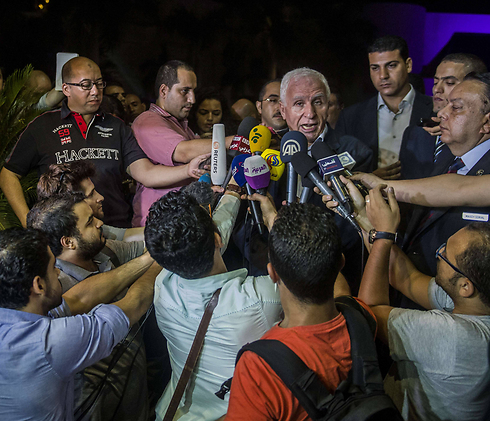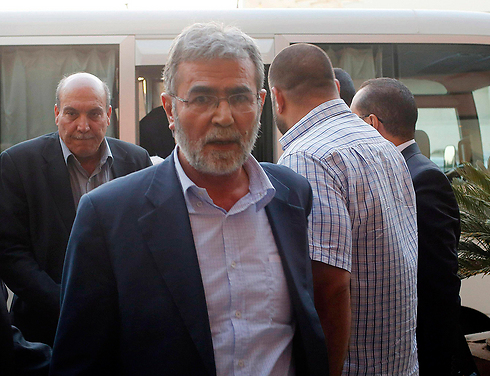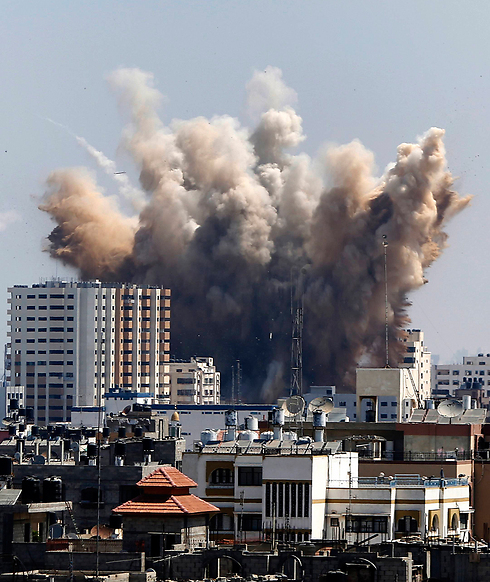Deal reportedly reached to see calm in Gaza extended based on two-pronged formula: Ceasefire in return for rehabilitation of Gaza and redevelopment in return for demilitarization; meanwhile, Israeli Cabinet convenes, Islamic Jihad says: War has ended.
Palestinian officials expressed optimism Friday regarding current diplomatic attempts to reach a long-term ceasefire in Gaza, as Israel’s Cabinet convened, presumably to discuss the looming deal.

Palestinian source close to the talks spoke with Ynet and said the current ceasefire deal was based on two simple formulas which together formed the agreement: (1) A ceasefire deal in return for Gaza’s rehabilitation, and (2) redevelopment of Gaza in return for demilitarization of the Strip.
The two pronged deal will be gradually implemented, the sources said.
Economy Minister Naftali Bennett seemed to hint a deal existed, but said that Israel should make unilateral concessions to Palestinians in Gaza without actually reaching an agreement with Hamas, which he claimed would empower the terror group.
Speaking at the end of Cabinet meeting Friday morning, Bennett said Israel should open Gaza’s border crossings and expand the Strip’s fishing zone unilaterally, without reaching a deal with Hamas, which he said “harms our right to target (terror) tunnels.”
Speaking to Israel Radio, Environmental Protection Minister Amir Peretz said Friday before the meeting that that Israel “in the midst of the final stages of negotiations.”
The Palestinian Islamic Jihad’s second-in-command, Ziad Nahala, said Friday that the “war was over.”

Ziad Nahala (Photo: Reuters)
Speaking to Al Hayat, Nahala said that “at this point we have no choice but to reach a truce. That stands at the head of our priorities. I believe that we are approaching an agreement.”
“The great destruction caused by the war obligates us,” he said, adding that though the majority of the Palestinian delegation’s demands were not met, “Our achievements are acceptable.”

Photo: AP
Two-pronged deal: From ceasefire to demilitarization
The ‘ceasefire for rehabilitation’ and ‘redevelopment for demilitarization’ formula will be gradually implemented, and each will be conditioned on the other.
In the first stage, a deal will be signed promising a calm period during which time Gaza will go massive rehabilitation efforts, and stipulates a number of international projects for rebuilding the Strip.
In the second stage, in return for a demilitarization of Gaza, larger infrastructure development projects will begin, also under international oversight.
Nonetheless, it is far from certain a Palestinian commitment to a demilitarization of Gaza will include a complete disarming of all of the terror factions in Gaza.
Moreover, the relative level demilitarization will influence the level of redevelopment, and therefore, as Hamas will retain some of its arms and military capabilities, there will not be a sea or air port in Gaza; however, movement from sea and land will be permitted under international oversight.
Israel’s goal in such a deal is to block potential rearming by terror factions, first and foremost by Hamas and the Islamic Jihad.
Egypt for its part wants to create a situation in which Hamas cannot create its own arms and rockets through materials smuggled Rafah tunnels, diverting these materials to international forces working on reconstructing the Strip. Thus Egypt, with the support of Israel, is de facto tightening its hold over Hamas.
Palestinians claim that the current five day lull is not a sign of progress, but only a sign that the sides believe that a deal can be reached given more time. They further claim that the discussion regarding sea and air ports – one of the Palestinians central demands – have been postponed to next month.
A Palestinian involved in talks told Asharq Al Awast that the chances of reaching a deal were more than 50 percent, but noted that “a number of issue remains.” According to him the chances of reaching a deal were contingent on “Israel’s desire to reach a long term accord.”
Speaking to the paper, Palestinian Prime Minister Rami Hamadallah reuitered that the Palestinian delegation is unified, after initial talks exposed anger at Hamas by more moderate Palestinian factions.
“These are not Hamas’s conditions, Hamadallah said, “they are Palestinian demands. There is a unified delegation in Cairo which represents all political factions, even of those in the diaspora.
“The demands are the lifting of the blockade and the opening of the crossings, among others. And these are not the requirements of a particular faction but the Palestinian people and leadership.”



I do not agree with Bennett, in the long term it would better for Israel to work with Hamas, strengthen and support Hamas economically. If Hamas builds a viable gaza with political and economic power then it is more likely to develop separately from the west bank and less likely to seek union with the west bank. It is in Israels interest to keep them separate and strengthen each party independently in their separate areas so that neither wants to give up anything to the other for union. If gaza were to have massive development then perhaps young pals would go to work in Gaza and stay there. Israel has given up gaza and therefore it should seek emigration for pals in YS.
Whether Israel recognizes hamas or not she still has the problem, it might be better to keep PA out of gaza. I presume that it has been in Israels interest to maintain a hostile gaza and enmity between gaza and the west bank but Israels approach has been to facilitate PA by remaining hostile to hamas. To me they are pretty much the same except those getting rich are more amenable to deals.
Hamas should not be allowed to take part in reconstruction. If allowed, it will give Hamas a credit to get recruits for its nefarious plans against Israel.
Disarmament of Hamas and demilitarization of Gaza should remain Israel’s priority. Hamas cannot be trusted. The agreement should be made with Egypt to make sure Hamas would be disarmed and Gaza be demitaralized in a limited period of time. If not, additional meaningless truce and an agreement that keeps Hamas in power should be avoided by defeating the terrorist now.